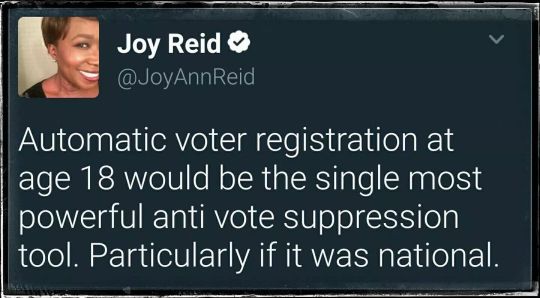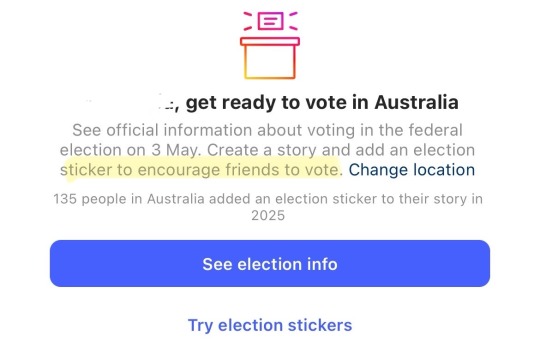#compulsory voting
Explore tagged Tumblr posts
Text
Compulsory Voting Looks Like...?
In my Voting With Spite post, I mentioned that Australia has compulsory voting, and I noted that quite a few people had either positive or negative reactions to that idea. I thought it might be a good idea to talk briefly about what Compulsory Voting actually does to your voting scene.
Now, to be clear, I'm going to be talking about the Australian Experience - that's what I know. I'm aware that Brazil and Belgium both have Compulsory Voting as well, and their experiences are likely to be a bit different. So, let's go through the big ones:
Do you need ID to vote?
Here, the answer is no - an ID can help, because when you get your name marked off the roll at a voting station, they use your name and address, and our driver's licenses have that, but it's not essential. Indeed, if you've changed address and that hasn't been recorded on the roll, you can still vote - this is called a "declaration vote", because the vote is put into an envelope where you "declare" that the information provided is correct, and the vote is counted once the electoral commission has verified the information.
One might think that this open up our system to a lot of fraud, but one of the fun parts about compulsory voting is that voter fraud is very easy to study - in such a system, if someone steals someone else's identity to vote, it will appear that that person has voted twice, and it gets investigated. The only other big fraud option is fraudulent enrolment - and again, because everyone is on the electoral role, if there's concern regarding a fraudulent enrolment, the electoral commission can check with people at the address of the enrolment. The AEC do these sorts of checks after every election, and it turns out, while there are often double votes, most of those are administrative errors (crossing off the wrong person somewhere), or entirely innocent (people with memory issues voting multiple times because they forgot that they'd already voted). During the 2018 election, only 118 cases were deemed worth forwarding to the Federal Police, out of over 20 million votes.
Do Politicians still play to the base?
In Voluntary voting systems, there is a well-known phenomenon where there's an incentive for politicians to, instead of trying to aim for policies that will satisfy the most people, to instead aim directly at their "base", their natural political home voters. The idea is that you don't actually need to persuade the other side to vote for you, you actually need to persuade your side to vote for you. The only prevailing counter to this is that you don't want to be so egregious that you motivate the other side to vote against you.
Historically, this has not been the case in Australia. In Australia, you can depend on your base to vote for you - they aren't going to stay at home, because it's compulsory to vote.
So they play to the centre?
Honestly, it's complicated. The question is often not about whether you're politically "in the middle", but where you live - Just like in other electorates, there are safe seats (where voter movement isn't likely to kick out the incumbent party) and marginal seats (where the margin of votes for a given party is quite small, generally less than 5%). Marginal seats are where political parties can potentially score a seat with only a little bit of a push, so it's standard strategy to build your campaign promises to directly target those marginal voters.
What those marginal voters actually want varies quite a bit, depending on where in the country they are - a marginal seat in Rural NSW need different targeting than a tiny marginal seat in Melbourne. In general these voters are looking for actual improvements in facilities and economic policy, rather than ideology, so while politicians from those seats may be absolute culture warriors, that often isn't what people in the seat are asking about or listening to - they want to know what the nutcase is actually going to do for them.
With that said, rural voters are more likely to want a personal connection to their MP and are much more likely to vote on who they, personally, like the most. This is less the case in Urban electorates, who care much less about who the MP is and what they're like, and much more about their party's platform.
But also also, there is a strong emphasis in politics about playing to "Ordinary Australians", which one can consider a code for "centre views". Of course, Australia as a society is pretty conservative in many ways, so what you consider "centre" may be a little left of what we consider "centre"...
So yeah, not nearly as simple as "playing to the centre" - there's a lot more involved there.
Are there such thing as "Independent" voters?
In Australia, at least, the idea of an "Independent" voter doesn't really exist - Australia's leaders aren't voted for in Primaries, so you don't need to have your political affiliation marked. Some Australians are members of political parties, but that number is tiny - in 2022, the two major parties had 100,000 members between them, in a population of 26 million people - about 0.4% of the population, maybe 0.5% if we count all the minor parties as well.
Are compulsory voters more engaged voters?
In a word? No. Australian society in general doesn't encourage people being overly involved or engaged in politics, especially in working-class subcultures (and of course, every Australian claims to be working class, regardless of their actual class). Like in many places, there's a pressure in face-to-face conversation to suppress political discussion to avoid conflict, and I can assure you that researching your candidates/parties before an election isn't a common activity (and I understand why - there's so many of them).
As a consequence, Australians don't tend to change their vote that often - in fact, studies in Australia have shown that there's a strong correlation between how you vote, and how your parents vote. A Labor voter is likely to stay a Labor voter, and a Liberal voter is likely to stay a Liberal voter, even if they're not a member of the party. This is why most election promises are much more about giving stuff to voters, rather than about legislation around society itself - It's considered safer to deal with infrastructure than it is to deal in culture wars issues.
Wait, if voters don't change often, how do opposition win?
Well, rarely is the honest answer to that question here. Since 1950, the party in federal government has changed only seven times:
Once in 1972, from the Coalition to Labor
Once in 1975, from Labor to the Coalition (although that one was a particularly odd one)
Once in 1983, from the Coalition to Labor
Once in 1996, from Labor to the Coalition
Once in 2007, from the Coalition to Labor
Once in 2013, from Labor to the Coalition
Once in 2022, from the Coalition to Labor
And during that time, there's been 27 elections, so in 20 out of 27 elections, the incumbent won. But with that said, every time the opposition wins, it's in a landslide, winning a huge number of seats.
The reasons for this are obviously complex, but the way I like to think about is that in Australia there's a certain inertia in the voting populace. Once your vote is set, there's not a lot that's going to change that vote - you're generally going to vote for the party that aligns most with you, and that isn't likely to change much. But as a party keeps fucking up (because they always fuck up), the more that votes wobbles - it might, initially, move your party down the preferences, which you might not notice (because it still funnels to you), but eventually, you've pissed off so many people that everyone votes for anyone but you arseholes, which results in the other party getting in with a landslide.
The previous government is usually horrifically savaged, to the point that it takes a few election cycles for them to slowly rebuild numbers, regain talent, and get themselves into a position where, now that the other side has fucked up sufficiently, voters are willing to let them have another shot at the big time.
This, awkwardly, also tends to stifle politically-lead social change, as well. Firstly, it can take decade or more for a party that is willing to engage with your chosen direction of society to become the Government, and even once they are there, it tends to be the case that Governments won't consider leading such changes until they are certain that everyone wants it - The Gay Marriage Postal Survey is an example. Any opinion poll could show you that the majority of Australians were for gay marriage, but the Coalition government of the time was against it. As a delaying tactic, they insisted on a postal survey (it couldn't be a plebiscite, because they couldn't get that through their own MPs) so every Australian had to vote on the issue. The result? 61.6% were for Gay Marriage (and up to 90% in some electorates!).
What if you can't vote?
Australia is something of a world leader in working to ensure that everyone can vote, because it's been generally established that you can't punish someone for not doing something the government has made it impossible for you to do. So, all Australians have access to:
Early Voting (usually for at least 3 weeks before election day)
Postal Voting (and you just have to post it on Election day, it can be received afterwards).
The voting infrastructure is set up that you can vote at any polling station in your state (we now print lower house ballots on demand, so every station has access to every ballot), and there are specific polling stations for interstate voters (where upper house ballots for every state are available).
There are mobile polling stations for voters, so even if you live in a remote town and can't drive to the nearest polling station, polling stations can drive out to you!
These mobile polling stations also attend prisons and hospitals to provide voting access for people who cannot leave to vote.
We even now have telephone voting for Blind folk, with a specialised system set up to allow for a secret ballot, so the phone person assisting the blind voter won't know who the blind voter is.
Australian embassies in other countries are also available for voters, although you are not actually required to vote if you're not in the country during the election campaign.
So, our voting infrastructure is built, as much as is practicable, to ensure that every voter gets every opportunity to vote. If you can't get to a booth on the day, you can early vote or postal vote.
To be clear, this is not a requirement of compulsory voting - it's quite possible to go to this level of effort in a voluntary voting system, and I can absolutely imagine a compulsory voting system that also made it difficult for people to vote (likely disproportionately affecting your political enemies).
Does Compulsory Voting help Minor Parties?
Not really - Preferential voting definitely helps minor parties, but not Compulsory voting. There is one way it might help though - As noted above, if you're pissed off with your current party, you may bump another party higher up on your preferences, even put them as your "1" vote. In a Voluntary voting system, such people might, instead choose not to vote and stay at home, so in that sense, I guess minor parties can be the beneficiaries of voter anger, but of course, that couldn't be the case without preferential voting.
Got more questions? My asks are always open! Ask away!
92 notes
·
View notes
Text
I am lowkey curious, do you guys think compulsory voting? (Its compulsory in my country and ik people have mixed opinions on it)
8 notes
·
View notes
Text
Compulsory Voting


رأیدهی اجباری روشی است که در آن حکومت، مردم کشور را قانوناً مجبور به شرکت در انتخابات نموده و در صورت عدم شرکت شخصی، وی را با مجازاتهای مختلفی چون محرومیت از خدمات اجتماعی یا جریمههای نقدی و ... مجازات میکند.
(Wikipedia)
ـ.ـ.ـ.ـ.ـ.ـ.ـ.ـ.ـ.ـ.ـ.ـ.ـ.ـ.ـ.ـ.ـ.ـ
در قانون ایران خوشبختانه مثل اکثر کشورها رأیدهی اجباری وجود ندارد و هیچ ایرانی قانونا مجبور به رأی دادن نیست و این حق برای او در نظر گرفته شده است تا بدین وسیله اعتراض خود را نشان دهد مثل ترک مجلس در هنگام رأی گیری توسط بعضی از نمایندگان مجلس که در ایران هم رخ داده است
که اگر این عمل هماهنگ شده و در تعداد معین باشد اصطلاحا به آن "آبستراکسیون" یا از حدنصاب انداختن میگویند
Obstructionism
وقتی بالای ۵۰٪ مردم ایران در انتخاباتی شرکت نکنند عملا آن انتخاب بیارزش هست
.
اما در ایران که موازی قانون بلکه بالاتر از آن ، "شرع و مر��عیت" وجود دارد وقتی بالاترین مقام دینی و سیاسی آن ، فرای قانونی که اجبار در آن نیست به صراحت میگوید
شرکت در انتخابات یک "واجب عینی" هست و در مقابله با آن بالای ۵۰٪ مردم به این واجب شرعی اعلامی از طرف او "نه" میگویند چه معنایی خواهد داشت

بیایید در آنچه هست تناقض را آشکار کنیم ایران فعلا "جمهوری اسلامی" هست پس همچنانکه نباید قانونی تصویب شود مخالف اسلام ، قانونی هم نباید تصویب بشود خلاف جمهور
اما چرا در قانون به شخصی چنان قدرتی دادید که حرفش اگر در قانون نبود باز لازمالاجرا باشد (مثل پادشاهان)
قانون در ایران که به واسطه ی جمهور نمایندگان تصویب میشود چرا نمایندگان قانونی تصویب کردن که جمهور خودشان و در پیرو آن مردم را نقیض باشد
همچنان که شواری نگهبان دقت میکند مبادا مجلسیان چیزی تصویت کنند که اسلام را نقض کند باید دقت میکرد چیزی تصویت نشود که جمهور را تباه کند
البته میدانیم این بیدقتی نبود دستور خمینی و یاران او بود تا "ولایتمطلقفقیه" در قانون گنجانده شود

آری قبلا به آن میگفتن پادشاهی و پادشاهان نیز خود را نماینده خدا بر زمین میدانستند
آخر این چه استدلال غیراخلاقی هست که بعضی ها میگویند مردم خود انتخاب کردن که اینچنین باشند چراکه با انتخاب کردن خمینی به رهبری ، او هر چه بگوید یعنی مردم گفتن
.
مردم بالاتر از انتخاب ، اعتماد کردن به چیزی بنام جمهوری اسلامی که در راستای اهدافشان قدم بردارد
وقتی معتمد از اعتماد به نفع خودش سوءاستفاده کند درخواست عزل ، نباید پاسخش ��لوله یا زندان و طناب دار باشد
مردم ایران بارها با روش های مدنی این درخواست را اعلام کردن
ـ.ـ.ـ.ـ.ـ.ـ.ـ.ـ.ـ.ـ.ـ.ـ.ـ.ـ.ـ.ـ.ـ.ـ
به قول خمینی: بترسید از روزی که مردم بفهمند…ـ
جالبه نه ، خمینی در لفظ میگوید این جمهور را تضعیف نکنید
.
وقتی انسان حرفی میزند که آگاه به ذات آن نیست مثلا بیتی از شاعری ، آیه ای از سوره ای ، جمله ای از بزرگی ، یا سوادش کم است یا شعورش و یا باطنش البته امیدوارم چنین باشد چون اگر به ذات حرفش آگاه باشد ولی در واقع خلاف آن عمل کند ، حیلهگر است
و باز به قول خمینی"لفظ را همه میگن شاید اگر از شیطان هم بپرسید…"ـ
END
ـ.ـ.ـ.ـ.ـ.ـ.ـ.ـ.ـ.ـ.ـ.ـ.ـ.ـ.ـ.ـ.ـ.ـ
پ.ن : دو عکس آخر این پـُست ، درخواستی بود از همکار
این روز های من
Photo made by:
DALL·E 3. For @30ahchaleh
.
.
.
#30ahchaleh#na_zzanin#ناظنین#Vote#Compulsory voting#Obstructionism#رأی بی رأی#رأی دهی اجباری#رأی_بی_رأی#رای بی رای#رای_بی_رای#آبستراکسیون
2 notes
·
View notes
Text
Compulsory turning up and getting ticked off has real advantages.
No one can stop you spoiling your ballot if you really insist.
While I’m here, rank preference voting is a much better option than first past the post
the problem with not voting in order to send the message that you hate all the candidates and the entire system and therefore refuse to participate is that it's completely indistinguishable, as a signal, from not bothering to vote because you think the system is great and all the candidates are great and you'd be fine with any of them. so you might want to rethink the strategy there
22K notes
·
View notes
Text
PeoplesBillions
heres an idea to fight billionaires' billions:
create the PeoplesBillions foundation, a charity or public benefit organization whose purpose is to serve as a check on individual billionaires' monetary power and to fund pro-democracy and progressive entities and programs
it would, for example, secure funding for entities like PBS, and NPR, and fund pro-vote programs and anti-fascist organizations
its supporters donate a minimum of $100 every year
its board could comprise trusted #Democrats and #Progressives (vetted AOC-caliber civilians), whom could be replaced by The People (all donors) for not adhering to the The People's values, and whom serve a lifetime limit of 5 years
with a 100M membership, the org would raise $10B every year (tax free!)
#fight fire with fire#universal voting#compulsory voting#AOC#life over profit#PeoplesBillions#The People#PBS#NPR
0 notes
Text
I’m wondering how Australia’s politics are doing…
You hear about the rise of fascism in the US, Britain, Germany, Italy, India, among many others, but not about Australia. Guess that compulsory voting is doing wonders?
0 notes
Text
Voter Apathy -- Part II (A Reprisal from 2018)
Yesterday morning I reprised Part I of a three-part post I wrote in 2018 about voter apathy. Now, you might think that I should write a new one, rather than reprise one from six years ago, but as I read over it to refresh my memory, I find that these posts are every bit as relevant today as they were in 2018. Today’s is less critical than Part I, more of an assessment of who is more likely to…
#1965 Voting Rights Act#Center for American Progress#compulsory voting#Intelligencer#New York Magazine#Pew Research Center#voter disenfranchisement#women&039;s suffrage
0 notes
Photo
I'm also Australian & would like to confirm how surprised I was when I was younger & learnt how the US didn't have preferential voting like we did & didn't do compulsory voting.
It was probably the 2006 US midterms. 2004 was to obviously going to be a Bush victory for 11-year-old me to turn her gaze to it when we had our own elections that year & I foolishly thought Howard would be defeated. I wasn't switched on politically in 2000 or 2002 (do you expect 7-year-olds or 9-year-olds to be there yet?).
It probably wasn't until 2016 I learnt about all the gerrymandered seats in the US House (Queensland used to be heavily gerrymandered in a way known as the Bjelkemander, but that ended in 1991).
But yeah, here's the thing. The average Australian probably isn't significantly different from the average American politically. And yet, the American political system is well to the right of the Australian system. Compulsory voting & Preferential voting are the two pillars that have kept our country & especially my state of Queensland, from becoming the hellscape that is the US Deep South. We have gun control, abortion, euthanasia, subsidised health care, trans rights & more because our parties are forced to appeal to everyone, not just the highly motivated. I won't get my way all the time (Voice to Parliament referendum, I was for it, as were the majority of my fellow Aboriginal Australians, but the majority of non-Aboriginal Australians weren't), but I certainly get my way more than I would under a US-style system.
Our Christian fundamentalists are as motivated as American ones are & have just as deep pockets, but when everybody has to vote, even that isn't enough to capture a political system.

#so glad we have compulsory voting where i'm from#preferential voting#compulsory voting#i love our two voting pillars#australia#usa#we are similar yet different
312K notes
·
View notes
Text
The State of Voting in America 2024
What do you think about the current state of voting in America? Voting is the cornerstone of any democracy, serving as the primary means by which citizens influence government policy and leadership. In America, however, the state of voting is increasingly dire. Voter suppression, outdated infrastructure, and political resistance to reform are pervasive issues that threaten the integrity of the…
#blockchain voting#Civic Engagement#compulsory voting#Democracy#Election Integrity#election reform#Election Security#online voting#political resistance#U.S. elections#voter education#voter participation#voter registration#Voter Suppression#voting infrastructure#voting laws#voting reform#voting rights#voting standards#voting technology
1 note
·
View note
Text
Australian voting system
Well I voted, then ate my democracy sausage!
Elections in Australia are super casual affairs compared to the US.
On the Saturday of the election, you go to your local school, church, or community hall where you'll find your polling booth. These are plentiful. You pass through a gauntlet of volunteers handing out 'how to vote' forms that hope to influence your vote at the last second. Generally, people are smiley and polite.
Once you reach the front of the queue at your local hall, you have your name manually marked off a massive list of names by a volunteer. There are usually several volunteers, each with a duplicate list. You don't need to show ID. They simply ask who you are and confirm your address if necessary, then rule you off and hand you your two ballot papers, which they sign in one corner.
Finally, you go to a polling booth, where you vote manually with a pencil. These are brown cardboard popups including cardboard privacy screens between them. No curtains to hide you. A pencil is supplied, attached to the booth with a string. When done, fold your vote ballot papers up, then post them into the cardboard boxes supplied.
Later, the votes are tallied by hand at each individual polling station, usually by the same volunteers who marked your name off the list.
Very low tech. Incredibly low rate of voter fraud. No need for anything more complicated.
#auspol#australian elections#the polling booths are cheap and recyclable#voting is compulsory here so they make it easy
24 notes
·
View notes
Text
it's $20 my dude.
And if you couldn't make it on the day cause you were sick or whatever, you just reply to the letter & half the time they waive it for you.
This is what it means to NOT live in a fascist state, or one run by oligarchs.


449 notes
·
View notes
Text

Incredible sequence of posts on the dash just now
#to be clear bc i know im swinging a bat at a hornets nest i think both of these posts make decent points#i am a socialist but i do not believe that revolutionary and reformist politics are necessarily mutually exclusive#multiple things can be true at once#capitalism is a fundamentally exploitative and violent system which must be swiftly dismantled for the sake of all life on the planet#and those who enter parliamentary politics in hopes of enacting reform often end up serving the interests of capital and western imperialis#but at the same time#we must not abrogate responsibility by refusing to exercise our hard-won democratic right to participate in elections#its an insult to the millions of people around the world living under authoritarian regimes for one thing and its fucking stupid for anothe#we must be realistic about the state of class consciousness in most western societies and work pragmatically with the tools available to us#we must also try to minimise harm and suffering as best we can and produce the best outcome for the greatest number of people#while also not leaving behind those who are marginalised#at times both reform and revolution seem impossible tasks and yet we must continue to work towards them both as best we can#on the topic of voting - i live in australia where its compulsory and where we also have preferential voting#which means that its impossible to “waste your vote” by voting for a minor party#i typically vote for our greens party - who are the largest minor party in the country and the most progressive on most issues#for example they're basically the only ones consistently condemning our (labour) government's support of israel#so to be clear for the americans reading these tags#if i lived in the USA i would vote in every election#i might sometimes vote for democratic candidates if they had genuinely progressive policies#but no i would not “vote blue no matter who”#okay i'm finished tilting at windmills now im just paranoid about being misinterpreted asdgfhjklk#voting#elections#the trolley problem#reform#revolution#leftist#socialism#marxist
8 notes
·
View notes
Text
There is a lot of posts at the minute shaming people for not voting, which is understandable.
But, this post for everyone who wanted to vote, but couldn't.
It's not your fault.
People in power have put a lot of time, effort, and money into suppressing people's votes. So if your vote got suppressed, whether you've been labelled a criminal unfit to vote, or there was impossible legal hoops for you to jump through, or any thing else that could of happened. However this turns out, it's not your fault.
You deserve better than the system you've been given. I'm sorry your voice wasn't allowed to be heard.
#us election#hi. australian here. i still think it's weird that only 10 countries in the world enforce compulsory voting.#more countries should copy australia#talking lollie
8 notes
·
View notes
Text
Yes, voting should be a civic duty. And ranked-choice voting gives voters much more agency.
So, there's a lot of USians around who are very clearly fucking fed up with their political choices this election cycle, and planning to sit it out.
And I get it! What's the point of voting if there's no one to vote for?
The thing is, I'm Australian. In Australia, voting is compulsory. We don't get to sit out our elections, and I'll be real honest with you - we don't exactly get better choices than you lot. So how do you vote if there's no one to vote for? You find someone to vote against. And there's always someone to vote against.
Now, we have the pleasure of preferential voting in Australia - We get to rank every candidate from 1 to X, and I'll tell you, there's something so cathartic about putting the biggest bastard of the lot at the very bottom of your preferences. I understand that USians don't get that option - you get to mark one person, and that's it.
That means that you get one shot, so aim it at the biggest bastard of the lot. The candidate you most utterly detest. Put your vote in the worst possible place for them. Don't even think about who that vote's going towards, that's not the point. Remember, every vote is a vote against someone. Make sure you fuck up that someone's election day!
36K notes
·
View notes
Text
Not me rocking up to vote in the local election and finding out the mayor of my town (whose name I didn’t previously know) is running unopposed. So I’ve literally shown up to get my name ticked off a piece of paper.
No one wants to be the mayor of this place. I’m screaming 😂😂😂
#compulsory voting is so funny because I’m basically just here in hopes of a democracy sausage#other countries are so worried about voter fraud and#our voter card arrives in the mail without an envelope#no one cares here 😂😂😂
25 notes
·
View notes
Text
To American individualists who identify as collectivists:

#you need to vote in order to minimise harm#american elections#American election 2024#kamala harris#post modernism#garfield meme#politics#american politics#you aren’t a collectivist if you prioritise#you own personal moral purity above others lives#vote#USA#so glad we have compulsory voting here#American individualists who identify as socialists when#donald trump#was democratically elected:#damn that’s crazy
10 notes
·
View notes